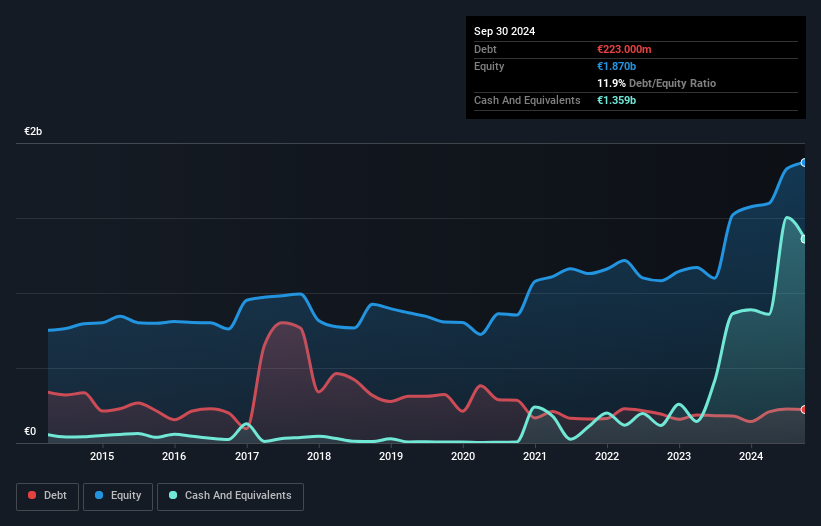
Legendary fund manager Li Lu (who Charlie Munger backed) once said, 'The biggest investment risk is not the volatility of prices, but whether you will suffer a permanent loss of capital.' It's only natural to consider a company's balance sheet when you examine how risky it is, since debt is often involved when a business collapses. We can see that NKT A/S (CPH:NKT) does use debt in its business. But the real question is whether this debt is making the company risky.
When Is Debt Dangerous?
Debt is a tool to help businesses grow, but if a business is incapable of paying off its lenders, then it exists at their mercy. Part and parcel of capitalism is the process of 'creative destruction' where failed businesses are mercilessly liquidated by their bankers. While that is not too common, we often do see indebted companies permanently diluting shareholders because lenders force them to raise capital at a distressed price. Of course, debt can be an important tool in businesses, particularly capital heavy businesses. When we think about a company's use of debt, we first look at cash and debt together.
View our latest analysis for NKT
How Much Debt Does NKT Carry?
The image below, which you can click on for greater detail, shows that at September 2024 NKT had debt of €223.0m, up from €179.7m in one year. However, it does have €1.36b in cash offsetting this, leading to net cash of €1.14b.

A Look At NKT's Liabilities
According to the last reported balance sheet, NKT had liabilities of €2.31b due within 12 months, and liabilities of €307.0m due beyond 12 months. Offsetting this, it had €1.36b in cash and €588.0m in receivables that were due within 12 months. So its liabilities total €669.0m more than the combination of its cash and short-term receivables.
Of course, NKT has a market capitalization of €3.53b, so these liabilities are probably manageable. However, we do think it is worth keeping an eye on its balance sheet strength, as it may change over time. While it does have liabilities worth noting, NKT also has more cash than debt, so we're pretty confident it can manage its debt safely.
In addition to that, we're happy to report that NKT has boosted its EBIT by 58%, thus reducing the spectre of future debt repayments. When analysing debt levels, the balance sheet is the obvious place to start. But ultimately the future profitability of the business will decide if NKT can strengthen its balance sheet over time. So if you're focused on the future you can check out this free report showing analyst profit forecasts.
Finally, a business needs free cash flow to pay off debt; accounting profits just don't cut it. While NKT has net cash on its balance sheet, it's still worth taking a look at its ability to convert earnings before interest and tax (EBIT) to free cash flow, to help us understand how quickly it is building (or eroding) that cash balance. Happily for any shareholders, NKT actually produced more free cash flow than EBIT over the last three years. That sort of strong cash generation warms our hearts like a puppy in a bumblebee suit.
Summing Up
While NKT does have more liabilities than liquid assets, it also has net cash of €1.14b. The cherry on top was that in converted 295% of that EBIT to free cash flow, bringing in €662m. So is NKT's debt a risk? It doesn't seem so to us. Over time, share prices tend to follow earnings per share, so if you're interested in NKT, you may well want to click here to check an interactive graph of its earnings per share history.
At the end of the day, it's often better to focus on companies that are free from net debt. You can access our special list of such companies (all with a track record of profit growth). It's free.
If you're looking to trade NKT, open an account with the lowest-cost platform trusted by professionals, Interactive Brokers.
With clients in over 200 countries and territories, and access to 160 markets, IBKR lets you trade stocks, options, futures, forex, bonds and funds from a single integrated account.
Enjoy no hidden fees, no account minimums, and FX conversion rates as low as 0.03%, far better than what most brokers offer.
Sponsored ContentValuation is complex, but we're here to simplify it.
Discover if NKT might be undervalued or overvalued with our detailed analysis, featuring fair value estimates, potential risks, dividends, insider trades, and its financial condition.
Access Free AnalysisHave feedback on this article? Concerned about the content? Get in touch with us directly. Alternatively, email editorial-team (at) simplywallst.com.
This article by Simply Wall St is general in nature. We provide commentary based on historical data and analyst forecasts only using an unbiased methodology and our articles are not intended to be financial advice. It does not constitute a recommendation to buy or sell any stock, and does not take account of your objectives, or your financial situation. We aim to bring you long-term focused analysis driven by fundamental data. Note that our analysis may not factor in the latest price-sensitive company announcements or qualitative material. Simply Wall St has no position in any stocks mentioned.
About CPSE:NKT
NKT
Designs, manufactures, and installs low, medium, and high voltage power cable solutions in Denmark.
Flawless balance sheet with solid track record.
Similar Companies
Market Insights
Community Narratives



